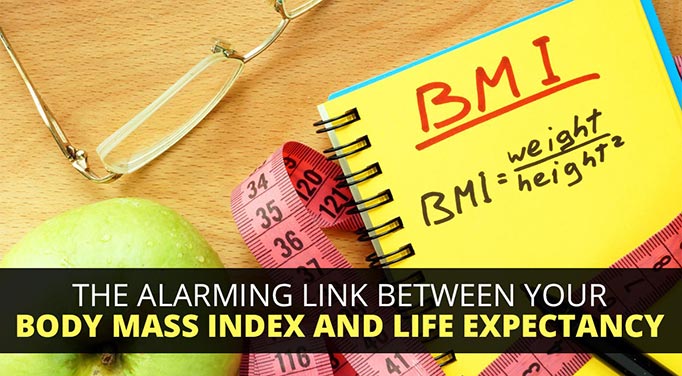 New research in weight and fitness has suggested that your body mass index and life expectancy are interlinked more than you imagined. This means the more underweight or obese you are, the less chance you have for living a long and healthy life. However, being overweight or obese is more difficult for some people to manage than others. One such case is when you are dealing with excess weight and adrenal fatigue.
New research in weight and fitness has suggested that your body mass index and life expectancy are interlinked more than you imagined. This means the more underweight or obese you are, the less chance you have for living a long and healthy life. However, being overweight or obese is more difficult for some people to manage than others. One such case is when you are dealing with excess weight and adrenal fatigue.
To determine whether a patient is of healthy weight, physicians and other healthcare specialists refer to their body mass index (BMI). This index is simply a measure of your body fat based on your current weight in relation to your current height.
A BMI ranging between 18.5 and 24.9 is said to be healthy. Meanwhile, a BMI that is less than 18.5 is classified as under a healthy weight. On the other hand, having a BMI of 25 to 29.9 is classified as overweight. Finally, a BMI of 30 and above, is classified as obese.
Keeping your weight within the healthy BMI range comes with several benefits. These include increased energy and ability to participate in more activities. You also experience less muscle and joint pain. Most importantly, you have significantly less risk for disease. These include type two diabetes, high blood pressure, high cholesterol levels, heart disease, and even certain cancers. This is precisely why a healthy BMI can readily increase your life expectancy.
Rising BMI levels are a major cause for concern in the U.S. and have been linked to higher death rates. According to a recent study by the University of Pennsylvania and the Boston University School of Public Health, the increase in body mass index had significantly reduced the annual rate of improvement when it comes to U.S. death rates from 1988 to 2011. It is estimated that the reduction in the rate of mortality decline is as high as 23 percent.
In addition, rising BMI levels have also led to a reduction in life expectancy at age 40 by up to 0.9 years in 2011. It is also said to account for as many as 186,000 excess deaths per year.
These research findings clearly exhibit the undeniable link between one’s body mass index and life expectancy. Hence, no matter how many technological improvements are made to make life easier, they won’t help you live longer with a BMI out of the healthy range.
Sadly, it is not just a sedentary lifestyle that leads to unhealthy BMI levels. Daily stress is also a contributing factor. In fact, stress can cause your body to become overweight or obese while also taking a toll on your body’s adrenal glands and its related functions.
When your body gets stressed out, certain reactions take place inside your body. Most of the critical activities can primarily be found within your hypothalamic–pituitary–adrenal (HPA) axis.
The HPA axis consists of various interactions and relationships between the body’s hypothalamus, pituitary gland, and adrenals. As part of your body’s NeuroEndoMetabolic (NEM) Stress Response, they all work together to help you cope with any stressful situation you may encounter.
When you encounter stress, your hypothalamus secretes a certain corticotropin-releasing hormone. This is responsible for sending a message to pituitary so that it can trigger the production of adrenocorticotropic hormone (ACTH). This, in turn, sends a message to the body’s adrenal glands to produce cortisol.
During times of stress, cortisol prepares your body for fight or flight. One of the ways that it does this is by raising the sugar in your bloodstream to give you enough energy to deal with the situation. At the same time, your adrenals release adrenaline, a hormone that raises your heart rate and increases your blood pressure.
All these interactions continue until your body reaches the correct hormonal levels to deal with stress. These days, however, people are often subjected to constant sources of stress. Because of this, the body ends up signaling for more and more cortisol until it reaches its maximum production level. And at some point, the body becomes unable to produce the cortisol your body needs to respond to stress.
 These prolonged stress episodes also cause the body to experience significant hormonal imbalance. In the early stages, you may only experience fatigue. When you do nothing to remedy your situation, however, your condition can eventually evolve to the more serious Adrenal Fatigue Syndrome (AFS).
These prolonged stress episodes also cause the body to experience significant hormonal imbalance. In the early stages, you may only experience fatigue. When you do nothing to remedy your situation, however, your condition can eventually evolve to the more serious Adrenal Fatigue Syndrome (AFS).
When suffering from AFS, your HPA axis becomes dysregulated. This state of hormonal imbalance has been associated with obesity. One study conducted by the University College London found that participants with high BMI levels and the highest cortisol levels were also the most likely to be unable to lose weight. Based on this, it is clear that stress can impact a person’s body mass index and life expectancy quite directly.
Once you start suffering from adrenal fatigue or AFS, your cortisol starts to go into overdrive. Typically, after a stressful episode, cortisol would work to increase your appetite to restore any energy you lost while responding to stress.
This may explain why you tend to crave certain foods after a particularly stressful day. The problem with this is that you tend to eat foods that are not healthy for you. These include sweets, salty snacks, and other foods that are high in carbohydrates. With constant stress-eating, you can gain weight quite easily. Before you know it, your BMI has gone from healthy to overweight or obese in just a relatively short period of time.
Unfortunately, cortisol also has some energy storage and conservation actions in the central abdomen. When tissues in the central body are stimulated by cortisol, they tend to sequester and store fat in an attempt to give you the energy to fight or flee danger. Cortisol is attracted to fat, in a sense, with peripheral adipose and subcutaneous deposits being redistributed to the central abdomen. The result is a bulging belly.
In addition, one study done by the University of Göteborg in Sweden found that abnormalities in the pattern of one’s cortisol secretion causes abnormalities in one’s metabolism. This problem with metabolism is often seen in obesity cases.
There are several ways to improve your body mass index and life expectancy effectively over time. As always, however, keep in mind that any remedy may have unexpected side effects or work differently for your body. Hence, it is best to consult with your physician before trying anything, especially if you are planning to take supplements.
That said, here are some ways to combat obesity and adrenal fatigue once and for all:
These foods can readily deliver energy to your cells. They are also able to supply the body with all the power it needs to control inflammation. Some of the foods you should eat more of are vegetables like Brussels sprouts, asparagus, collard greens, kale, spinach, cauliflower, turnip greens, green peas, mushrooms, bok choy, broccoli, and tomatoes. Meanwhile, a recommended nutrient-dense protein is salmon.
As for fruit, cantaloupe is one of the most nutritious ones around as it is rich in vitamins A, C, and K as well as calcium, potassium, magnesium, and antioxidants. Other recommended foods include lentils, sweet potatoes, soybeans, sardines, shellfish, liver, egg yolk, cocoa, black beans, and almonds.
Healing your adrenals can only happen through restoring proper gut ecology in your body. One of the easiest ways to do this is to take some supplements that restore health to the body’s gut ecology. Probiotics and fermented foods like yogurt promote good gut health and can assist in weight loss at the same time.
Doing a gentle cleanse helps your adrenal health improve significantly. Assist your body in eliminating toxins by staying away from alcohol and eating a more nutritious diet. You can ask help from a physician to come up with the perfect daily meal plan.
 Your adrenals need vital minerals to get healthier. These include macro, micro, fulvic, and humic minerals along with amino acids. All these minerals help your body rebuild its cellular energy while supporting detoxification.
Your adrenals need vital minerals to get healthier. These include macro, micro, fulvic, and humic minerals along with amino acids. All these minerals help your body rebuild its cellular energy while supporting detoxification.
While you can choose to take supplements to make sure you get all these minerals, another option is to include more ocean vegetables in your diet. These include nori, wakame, agar, kombu, dulse, and hijiki. Some of these can be readily added to soups and salads while others need to be soaked in water before cooking.
Meal replacement is said to be one of the most effective ways to lose unwanted pounds safely. These plans involve two low-carbohydrate, high-fiber shakes each day, followed by a low-calorie meal. Doing so allows you to manage cravings much better. As a result, you are able to lose weight safely.
Improving your body’s body mass index and life expectancy has a lot to do with making your metabolism more efficient. One way to jumpstart your metabolism is to maintain very low-calorie intake for four weeks. According to a study conducted by the Rowett Research Institute in Aberdeen found that a very low-calorie diet resulted in acute weight loss among its obese participants. This was after consuming only 800 calories a day. You can also focus on exercise, getting enough sleep, and take herbs and supplements to help kick your metabolism into high gear. However, those with AFS need to be careful about any more drastic measures, as they can cause a crash.
 As you can see, the relationship between body mass index and life expectancy is further affected by your body’s adrenals and the rest of the HPA axis. This means that when you allow stress to take over your life, you compromise your health more severely than you can imagine.
As you can see, the relationship between body mass index and life expectancy is further affected by your body’s adrenals and the rest of the HPA axis. This means that when you allow stress to take over your life, you compromise your health more severely than you can imagine.
Therefore, it is wise to take proactive steps to lose weight and keep stress out of your life as much as possible. It helps if you can learn to manage stress before it wreaks havoc on your body. When you take on a more relaxed approach to living, your body can heal. Weight loss can be a long and challenging process, requiring major lifestyle changes that need to be maintained over the long haul, but your health, body mass index and life expectancy will thank you for the effort you put in now.
© Copyright 2018 Michael Lam, M.D. All Rights Reserved.
Your body mass index and life expectancy directly affect each other. With a healthy body mass index, you have reduced the risk of disease, helping to extend your life. In contrast, an overweight or obese body mass index puts you at risk for deadly diseases like heart failure and cancer.

